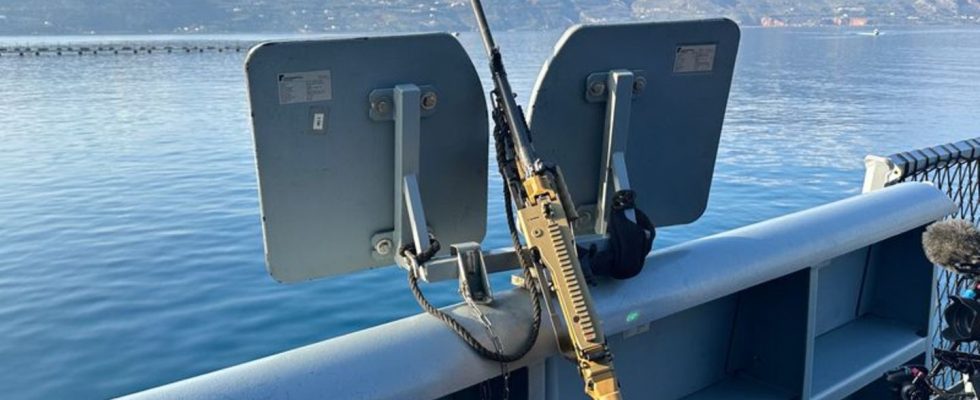EU mission “Aspides”
Bundestag gives the starting signal for naval operations in the Red Sea
An MG3 machine gun on board the frigate “Hessen”. photo
© Michael Fischer/dpa
Heavily armed, the German warship “Hessen” will now escort merchant ships through the Red Sea. It is the most dangerous naval operation in the history of the Bundeswehr.
By a large majority, the Bundestag gave the frigate “Hessen” the starting signal for its dangerous mission in the given to the Red Sea. 538 of 573 MPs voted for German participation in the EU mission “Aspides”, which is intended to protect merchant ships from attacks by the Houthi militia, which has been heavily armed by Iran. 31 parliamentarians voted against it, four abstained. In addition to the three traffic light factions SPD, Greens and FDP, the CDU/CSU and the AfD also signaled their approval in the debate.
240 men and women on board
The “Hessen” had already set off from Wilhelmshaven towards the operational area a good two weeks ago in order to be able to begin fulfilling its mission immediately after the Bundestag decision. The deployment of the 240 men and women on board is considered the most dangerous naval operation in the history of the Bundeswehr. The mandate is initially limited to one year. Up to 700 Bundeswehr soldiers can take part in the mission.
The Houthis operating from Yemen want to force an end to the Israeli attacks in the Gaza Strip by shelling ships, which are a response to the terrorist attack by the Islamist Hamas on October 7th.
The sea route through the Red Sea and the Suez Canal is one of the most important trade routes in the world. Because of the Houthi attacks, large shipping companies are increasingly avoiding the shortest sea connection between Asia and Europe. This is now having a significant impact on the global economy.
Belgium, Italy and France are also sending ships
The USA and Great Britain have recently attacked Houthi targets in Yemen. The EU operation, on the other hand, is purely defensive. A total of 18 countries are involved in the operation. In addition to Germany, Belgium, Italy and France are sending ships to the Red Sea.
Shortly before the Bundestag vote, the Houthis announced that they would expand their attacks. The group’s leader, Abdel-Malik al-Houthi, said in a televised speech that the group’s leader, Abdel-Malik al-Houthi, was relying on escalation in response to Israel’s escalation in the Gaza Strip, as reported by Al-Masirah broadcaster. So far 48 ships have been attacked. Underwater weapons would also be used in the future.
“Hesse” on the “war march”.
The “Hessen” will be on “war march” from now until the end of April. This means that the crew is on alert around the clock in six-hour shifts and is therefore prepared for all possible attacks – be it with ballistic missiles, drones or even kamikaze speedboats with explosive charges.
“Basically, we assume that we too will be viewed as a target,” said the commander, Frigate Captain Volker Kübsch, on Monday during a visit by Defense Minister Boris Pistorius to the frigate.
The frigate “Hessen” was designed specifically for escort and maritime control. With its radar it can monitor an airspace the size of the entire North Sea – 350 kilometers in all directions. Their anti-aircraft missiles range more than 160 kilometers. In addition to the regular crew and two helicopters, there are also other emergency services on board, including a team of doctors and a military chaplain.

